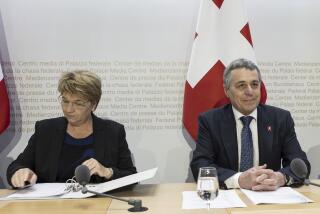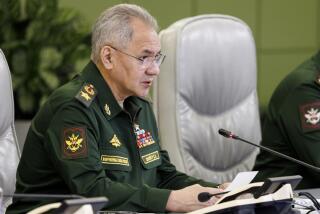Europeans weigh sanctions on Ukraine authorities following crackdown
MOSCOW -- Alarmed by an outbreak of deadly violence in Ukraine, the international community reacted Wednesday with urgent appeals for both sides in the bitter confrontation over the country’s future to renounce the use of force and negotiate an end to the 3-month-old conflict.
The European Union summoned its foreign ministers to an emergency meeting in Brussels on Thursday to consider “targeted sanctions” against those who ordered a brutal Tuesday night crackdown on protesters occupying Kiev’s central Independence Square.
In Paris, French Foreign Minister Laurent Fabius said he and the German and Polish foreign ministers will visit Ukraine on Thursday morning before traveling on to Brussels. It was necessary to consider, he said, whether “those who are responsible for these acts should continue to avoid sanctions.”
The conflict in Ukraine took a violent turn Tuesday when security forces stormed the protesters’ encampment, torching tents, lobbing tear gas and tearing down barricades. At least 25 reportedly were killed -- including nine police officers, some slain by gunfire or cobblestones and Molotov cocktails hurled by the protesters.
The demonstrators are demanding Ukrainian President Viktor Yanukovich’s resignation, a multiparty interim government and early presidential elections.
In a statement condemning “the unjustified use of excessive force by the Ukrainian authorities,” the EU, whose offer to Ukraine of an economic association agreement is at the heart of the social conflict, said the onus was on Yanukovich to end the violence and negotiate with his political opponents.
Meeting in Paris with Fabius, Secretary of State John F. Kerry said Washington was also weighing sanctions, though he said the United States would prefer to see Yanukovich instead pull back from his confrontation with protesters.
“We are talking about the possibility of sanctions and other steps with our friends in Europe and elsewhere,” he said, suggesting that such steps might help “create the environment for compromise.… We are convinced there is still space for that to happen.”
Vice President Joe Biden called Yanukovich to echo the EU’s contention that, according to a White House statement on the phone call, the Ukrainian government bears “special responsibility to de-escalate the situation” and address the protesters’ “legitimate grievances.”
The Russian government offered a very different view of the conflict, blaming “a policy of connivance on behalf of Western politicians” who the Kremlin contends have been egging on the anti-government protesters from the start.
Western leaders and European “structures” – an apparent reference to the 28-nation EU – “have turned a blind eye to the aggressive actions of radical forces in Ukraine, encouraging them to engage in escalation and provocations against the legitimate government,” a Russian Foreign Ministry statement said.
Yanukovich had been expected to sign the EU association deal, inaugurating a process of integrating Ukraine into the Western economic and social union, at a summit in Lithuania in late November. But the Ukrainian president announced at the time that he was abandoning the plan for closer ties with the EU in favor of shoring up his country’s traditional collaboration with Russia in trade and industry.
Russian President Vladimir Putin has since promised Yanukovich $15 billion in loans and energy subsidies, de facto aid that those in favor of EU association consider a bribe to keep Ukraine within the Kremlin’s political and economic orbit.
Putin’s spokesman, Dmitri Peskov, described the violent clashes in Kiev as a “coup attempt” but denied that Putin was advising Yanukovich on how to handle the crisis.
In contrast with the Western warnings that it was Yanukovich who is responsible for alleviating the tense standoff, Kremlin-controlled media quoted Russian officials as saying that it is the Ukrainian president’s “prerogative” to decide how to put an end to the disorder.
France and Germany had been reluctant to endorse U.S. calls for sanctions against the Yanukovich leadership during past violent outbreaks or to pressure the Kiev regime to include opposition politicians in an interim government of technocrats to replace the Cabinet of former Prime Minister Mykola Azarov, who resigned last month. But officials in both countries indicated Wednesday that the deadly confrontation in Kiev had changed their minds.
French President Francois Hollande expressed “deep indignation” over the harsh crackdown by security forces against the demonstrators and called for “some individual sanctions” by the EU, said Elysee Palace spokeswoman Najat Vallaud-Belkacem.
In his statement on the Ukraine situation, EU Commission President Jose Manuel Barroso said it was time for the bloc’s governments to express their abhorrence of the violence by imposing sanctions on those responsible, such as entry bans and freezing of personal assets.
Twitter: @cjwilliamslat
More to Read
Sign up for Essential California
The most important California stories and recommendations in your inbox every morning.
You may occasionally receive promotional content from the Los Angeles Times.












